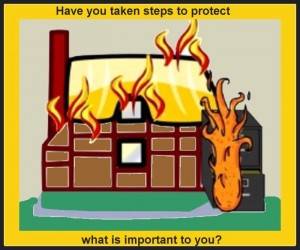 After the death of your partner, have you been left with a never-ending stream of paperwork? Furthermore, have you spent many weeks or more looking for important paperwork, phone numbers of people you need to contact, or been generally frustrated by messy recordkeeping?
After the death of your partner, have you been left with a never-ending stream of paperwork? Furthermore, have you spent many weeks or more looking for important paperwork, phone numbers of people you need to contact, or been generally frustrated by messy recordkeeping?
When your mind is foggy with grief, it’s especially difficult to concentrate and remember the necessary details of bank accounts, life insurance policies, safe deposit boxes, etc.
So, if this has been your experience, when it’s your time to go, I’m sure you would want to spare the rest of your family from this same confusion and stress. As you well know, that’s often exactly what you’re handed, if something unexpected happens and you haven’t shared your most essential details and decisions ahead of time.
I’m not talking about just the big stuff like whether or not you have a will. It’s a lot of the little things … the “I never thought of that” details that can really put your loved ones in a spin.
Even though you may have been in this situation, it’s very easy to “forget” to let your family know about certain items. For example, to you, the place where you keep your safe deposit key may seem logical. However, even if you told family members where it’s hidden, in the midst of grief, it’s doubtful they’ll remember.
I was recently introduced to a woman who can help you avoid this situation. She’s conducting a free webinar on Thursday, June 19th at 8:00 P.M. central. You can click HERE to register for it.
The webinar is set to explain the following and more:
- How to give your family the gift of knowing exactly what to do if the unexpected happens
- What information is critical to document
- Why it’s so essential
- Five things you can do immediately for yourself
- How to talk to your family members about making sure they understand your full picture
- How to talk to your aging parents about their situation
One of the presenters, Kristi Curry, is the Founder and CEO of Survivorship Now for over 10 years, she has provided a modern twist on getting your affairs in order and executor assistance to those who’ve been left with a mess by their loved one. The following is an article she wrote, which I believe gives her much credibility in this field.
What Everyone Can Learn from Three Widows
Back in the 1990s, I was in financial advising at a major firm, working with clients to create plans and helping them move closer to their investment goals. My two favorite parts of the role were learning how to work money and getting to know my clients and their families as friends.
Three of those clients were widows whose husbands had died and left them in various states of mess. Two husbands died suddenly and one died from a lengthy illness. The widows were in their 40’s, 60’s and 70’s when I met them.
The emotional toll on each widow was the same. These ladies, who had not participated much in their financial planning, were now meeting with me to try to put their lives together and understand what their futures would be.
The oldest of the three ladies had to learn how to write checks to pay the bills. Her husband had always written the checks. She had to learn how to balance a checkbook, understand what income she had coming in and how to budget for her expenses that she’d never been aware of. I became her cushion to break the fall and helped get her back to functioning on day-to-day tasks.
My other two widows were younger and had a better working knowledge of the finances, but the emotional toll of taking over the house, the finances and the planning for their future was devastating (to put it mildly). I even had one of them call me to ask if I knew a good mechanic because her car was dead and her husband had always taken care of the cars. It’s those types of nitty-gritty details like what mechanic to use that can really cause stress to those left behind.
In my time working for that firm, I learned that even though people are in a family, there are silos of life information that aren’t shared with loved ones. It’s a natural course of life, but not necessarily a good one. It’s been over 20 years since I worked in that position and the lessons I learned from those three women left a permanent impression on my life. I sometimes think of them and wonder if they made changes that would protect their own loved ones if something unexpected happened to them. Did they take their experience and prepare information for the “just-in-case-this-happens” day?
Our lives are complex and keeping up with life information is critical to us now and to our family in the future. Everyone can learn from these three ladies:
- Document your important details
- Have your legal documents current and executed and
- Communicate that plan with your loved ones
To learn more about how to give your family the gift of knowing exactly what to do if the unexpected happens, join her for a free webinar. You can register for it by clicking here.

